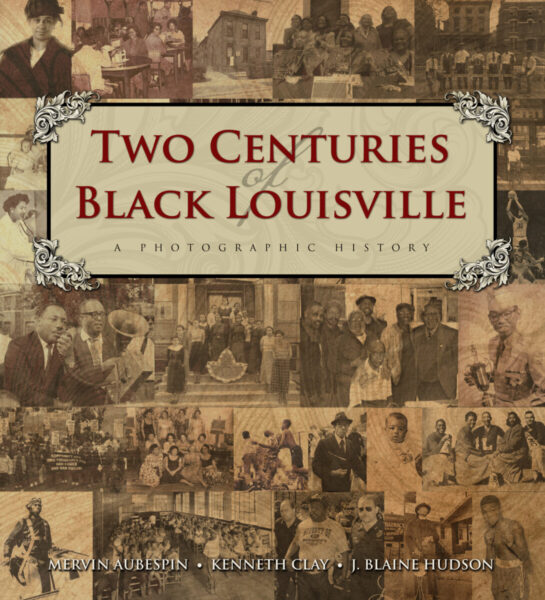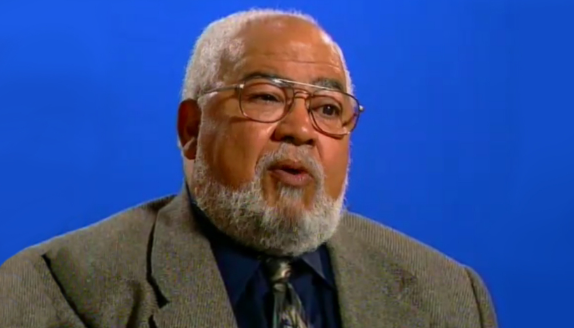Pioneer Artist, Reporter at Courier Journal
The late Unity: Journalists of Color, a coalition of the Black, Hispanic, Asian American and Native American journalist organizations, was miffed that New York University’s 2012 list of the top journalists of the last century was short on people who looked like them.
So they put together their own — a “seed list”– and of course Mervin Aubespin was on it.
Why? When “Uncle Merv” was inducted in 2007 into the National Association of Black Journalists’ Hall of Fame, NABJ summed up his career thus:
“Merv Aubespin: Past president of NABJ from 1983-1985. He established the organization’s first national office and increased the visibility of NABJ internationally.
“For 34 years, he worked as an artist, reporter and editor at the The Courier-Journal in Louisville, Kentucky and has served as an advisor to newspaper executives seeking to recruit and retain journalists of color.
“Thousands of professional and aspiring journalists across the country affectionately refer to Aubespin as
‘Uncle Merv’ as he remains a popular mentor and lecturer.”
‘Uncle Merv’ Aubespin died at 86 Wednesday and had been living in Southern California, Rachel Smith reported for the Courier Journal. The story did not list a cause of death, but Aubespin’s friend and Louisville colleague, Betty Baye, told Journal-isms June 27 that the cause was colon cancer and that Aubespin died at his home in Rancho Mirage, Calif.

Scott Coffman wrote in a review for the Louisville Courier Journal, ” . . . I am uncustomarily speechless at the sheer beauty of this volume. The muted colors throughout seem to mirror the lives portrayed, a sad darkness in the dispirited lives created by the slave trade. The rich sepias and ochers, however, burst from the page like the pride and promise so evident in the faces of those captured by the photographer’s lens.”
It was true, as Smith wrote, that Aubespin was a pioneer in Louisville. As Wayne Dawkins reported in “Black Journalists: The NABJ Story,” in 1965, “The Courier-Journal in Louisville, Ky., hired Aubespin. He was the paper’s first black artist.”
When riots erupted in Louisville’s Black community, Aubespin’s white colleague was sent back to the newsroom because of safety concerns, and Aubespin was asked to assume the role of reporter, which he continued for many years, according to a Courier-Journal account.
In 1972, Aubespin spent a summer at Columbia University for a crash course on news reporting.
He rose to associate editor. “As a reporter and later editor at The Courier-Journal, Aubespin covered the civil rights movement and led a team that wrote the award winning [40-story] 1981 series about being black in Louisville,” Keith L. Runyon, former editorial page editor, his colleague and good friend, would write.
Before joining the newspaper, Aubespin, a Louisiana native, was active in local civil rights demonstrations for public accommodations in 1961. He worked with Martin Luther King Jr. during the bus boycott in Montgomery, Ala., and participated in the storied Selma to Montgomery March in 1965.
He used some of that knowledge to co-author 2011’s “Two Centuries of Black Louisville: A Photographic History.”
But as the late David Hawpe, another friend and colleague of 35 years, would say, “Uncle Merv” was better known nationally than he was locally.
He founded NABJ’s first local chapter — in Louisville. Such organizations as the former American Copy Editors Society award scholarships in his name. He NABJ from 300 members to more than 1,000 and helped establish the association’s national office in Washington, D.C. (Membership is now triple that.)
Aubespin led journalists in 1985 on a report on drought in West Africa and has been a consultant on United Nations development programs. He has also been a member of the United Nations Task Force on AIDS in Africa.
The late Michel Marriott, who profiled Aubespin in 2000 for NABJ’s 25th-anniversary project on NABJ’s presidents, “Committed to the Cause” [PDF], elaborates:
“Not surprisingly, a hallmark of Aubespin’s term as NABJ president (beginning with a narrow election victory over a highly favored candidate [Acel Moore]) was significantly raising the profile of the organization, while greatly expanding its membership while lending it a more prominent presence in national and international arenas. In a sense, NABJ became truly progressive under Aubespin’s guidance and careful consensus building.
“In short order, Aubespin established the organization’s first national office. It was housed in a modest space in the building that was home to The Courier-Journal, the regional newspaper based in Louisville for which Aubespin worked more than 30 years as an artist (long ago he had designed NABJ’s familiar logo), reporter and administrator. He even hired a part-time secretary to do clerical work and answer NABJ’s telephone, simple yet essential tasks for an organization being transformed from a relatively small, insular group into a large, professional one.
“To further mark and ensure that transformation, Aubespin worked with NABJ’s new treasurer, Thomas Morgan III, to hire the organization’s first financial auditor. He stepped up publication of the NABJ Journal, turning it into a quarterly. He also traveled 100,000 miles, visiting, as he said, ‘every chapter I could and going everywhere I was invited.”
“The founder and twice-president of the Louisville Association of Black Communicators was, as he is still fond of saying, creating NABJ ‘family.’
“To this day thousands of young journalists affectionately refer to the gregarious, bespectacled man with a friendly round face and silver hair as ‘Uncle Merv.’ He remains a popular mentor and college lecturer.
“Almost right away, and not without controversy, Aubespin began forging visible alliances between NABJ and the organizational and corporate leadership of mainstream media. All the while he tried to allay fears of members troubled that NABJ, which was largely founded to challenge white media to open its newsrooms and boardrooms to black journalists, might be getting too cozy with those better kept at arm’s length.
“His strategy, he recalled recently, was sound: ‘I wanted to get white media leadership to involve itself in NABJ so it could establish some relationships and we could all be less confrontational.’
“As a result, he said, ‘For the first time white editors and news directors and white media leadership — with their financial resources — came together with NABJ and its mission.’ Supporters and critics agree that NABJ was forever changed by the infusion of white media interests and money.”
“When Aubespin was named the 2010 recipient of Louisville’s Dr. Martin Luther King Jr. Freedom Award, he invoked the spirit of the civil rights icon.
“I am honored that the city has chosen to recognize me for my efforts at making a difference,” Aubespin said. “I am particularly mindful that the award is named after Dr. King, who had a considerable impact on my life and the lives of so many others. During many conversations with Dr. King, one thing became clear — that change is made when people decide to get involved. I trust that I have lived up to that example.”
- Wayne Dawkins, Black Alumni Network/LinkedIn: Mervin Aubespin, directed NABJ growth age (July 1)
- National Association of Black Journalists: NABJ Mourns the Loss of Mervin Aubespin, Past President 1983-85



